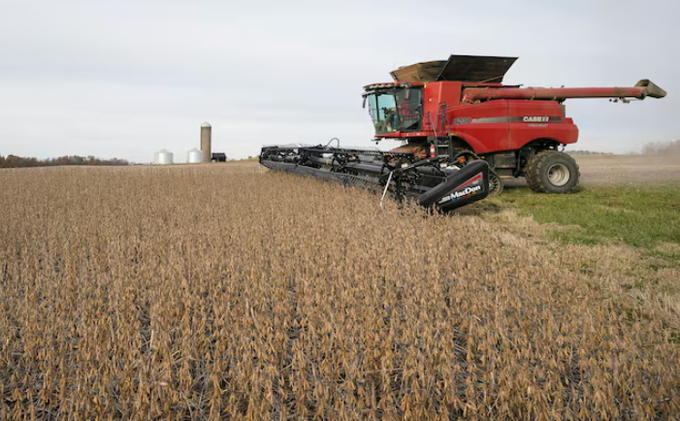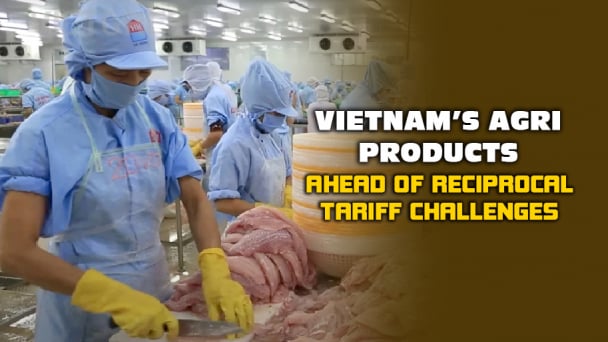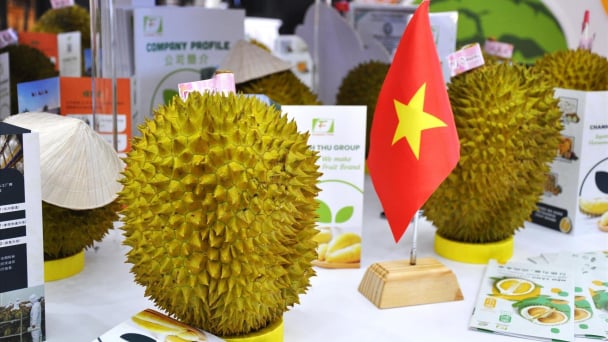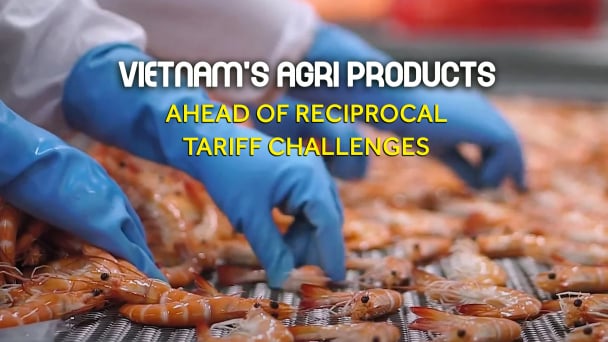May 31, 2025 | 22:02 GMT +7
May 31, 2025 | 22:02 GMT +7
Hotline: 0913.378.918
May 31, 2025 | 22:02 GMT +7
Hotline: 0913.378.918

Soybeans are harvested from a field on Hodgen Farm in Roachdale, Indiana, U.S. November 8, 2019.
Trump's Republican party enjoys wide support across the U.S. farm belt, where he won most states in Tuesday's election. Farmers typically back him even though the U.S. agriculture sector was one of the hardest hit during the U.S.-China trade war that Trump fought during his first administration.
China targeted the U.S. farm community with retaliatory tariffs on imports of American agricultural goods, after Trump imposed tariffs on a wide range of goods from China. U.S. soy exports to China have never recovered - in fact, China has slashed its dependence on U.S. farm goods since the 2018 trade war.
Farmers and two potential contenders for the position of Trump's agriculture secretary say they want his administration to focus on boosting U.S. exports and crafting trade deals to help revitalize the sector.
"We really need to get out there and represent the U.S. products and make sure that we get some sales on the books," said Kip Tom, an Indiana corn and soy farmer who served as ambassador to the United Nations food agency during Trump's first term.
But Trump is threatening new tariffs on Chinese imports, and China is likely to reciprocate. That would lead to less access, not more, to China's agriculture import market. Trump would also likely hit imports from other countries farmers would want to sell into with tariffs.
Trump, who beat Democratic Vice President Kamala Harris in the presidential election, has vowed to impose a 60% tariff on Chinese goods and at least a 10% levy on all other imports in his second term.
"I think it's terribly naive of anyone to think that the election of Trump and the Republican party will be positive for agriculture," said Jay O'Neil, a grain industry consultant and former economist at Kansas State University
A new round of trade wars would come at a tough time. U.S. corn and soy prices tumbled to 2020 lows this year under pressure from massive harvests and intense competition for global export sales from rival supplier Brazil. That has hit the U.S. agriculture economy hard and reduced demand for tractors, combines and other agricultural equipment from companies like Deere & Co.
The nation is projected to face a record $42.5 billion agricultural trade deficit in 2025, according to the U.S. Department of Agriculture.
U.S. soybean exports to China fell to about 26.4 million metric tons last year from 36.1 million in 2016 and 31.7 million in 2017, before the last trade war, the agency said.
Beijing failed to meet obligations for U.S. agricultural purchases under a 2020 trade deal signed with Trump to end the trade war, according to the Census Bureau.
Still, farmers said they think a new dispute with Beijing would be short lived and less economically painful.
"It won't be near as prolonged as it was the first time because they know he's serious," said Texas Agriculture Secretary Sid Miller, who worked to elect Trump.
Miller and Tom are seen as potential contenders for USDA secretary.
Trump's first administration kept farmers onside with generous subsidies to offset lost U.S. sales to China from the trade war. Soybean farmers received $5.4 billion more in aid than they lost in price impact, a University of California-Davis study found.
Another trade war could cost soy farmers $3.6 billion to $5.9 billion in annual production value, depending on how the dispute plays out, according to an October study from the National Corn Growers Association and American Soybean Association.
For corn, Brazil overtook the U.S. as China's top supplier in 2023, just one year after Beijing approved purchases from the South American agricultural powerhouse.
"We've let Brazil and Argentina and Australia and New Zealand and everybody else beat us to the punch," Miller said. "We've got to reverse that trend."
U.S. soybean exports to China were down 13% from a year ago through September and corn exports sank 71%, according to USDA data.
Such declines worry Dave Kestel, a corn and soy grower in Manhattan, Illinois, who used a plow to carve "Trump" in giant letters in a farm field ahead of the election.
Still, a trade battle with China could ultimately benefit U.S. workers, despite some temporary pain, he said.
"People on the other side are saying 'Oh my god, he's going to impose these tariffs,'" said Kestel, who voted for Trump.
"It's about bringing businesses back here again."
(Reuters)
/2025/05/30/5010-5-173638_943.jpg)
(VAN) On May 29, at the GO! My Tho Trading Center, the Tien Giang Department of Industry and Trade, in collaboration with Central Retail Corporation, held the opening ceremony of the 3rd Fruit Festival 2025.

(VAN) Reciprocal tariffs are exerting pressure on U.S. exports, prompting Vietnamese firms to shift their focus to Muslim markets, Thailand, and Brazil.

(VAN) A free booth for two years at Xinfadi, Beijing's largest wholesale market, will be allocated to Vietnam's agricultural products.

(VAN) Vietnamese shrimp exporters are actively looking for alternative markets and accelerating shipments to the United States in response to the pressure of impending reciprocal tariffs. This is occurring during a temporary tariff suspension.

(VAN) The import-export turnover between Vietnam and Singapore rose amid a trade rebound, with machinery, electrical equipment, and fuels making up the majority of the transaction value.

(VAN) Director General of the General Administration of Customs of China, Ms. Sun Mai Jun, has pledged to implement measures that will ease the import process for Vietnamese agricultural products.

(VAN) Although Vietnam is still increasing its coffee exports, the industry is currently in the process of determining market strategies in response to the U.S. imposition of reciprocal tariffs.